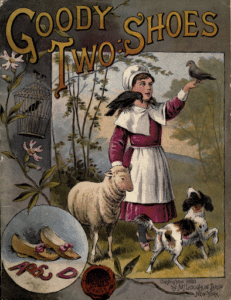
Goody Two Shoes was the title of a popular book of the 1760s. It’s a tale of a poor orphan girl named Margery Meanwell, who goes through her early years with only one shoe. When a wealthy gentleman gives her a complete pair, she’s so elated that she tells everyone about her “two shoes”. The story goes on to depict her journey toward worldly success and concludes with her earned virtue being rewarded with material prosperity. The book’s title has often been used as a pejorative against those unduly smug about their own contributions to such success.
The label “Goody Two Shoes” might apply to the Ephesian Christians Jesus addressed here.
“‘I know your works, your toil and your patient endurance, and how you cannot bear with those who are evil, but have tested those who call themselves apostles and are not, and found them to be false. I know you are enduring patiently and bearing up for my name’s sake, and you have not grown weary. But I have this against you, that you have abandoned the love you had at first. Remember therefore from where you have fallen; repent, and do the works you did at first. If not, I will come to you and remove your lampstand from its place, unless you repent. Yet this you have: you hate the works of the Nicolaitans, which I also hate. Revelation 2:2-6 ESV.
These believers were engaged in works endorsed by Jesus. They hated false doctrine (of those who are evil, false apostles, the Nicolaitans) and its ill effects. But the Ephesians began to fail in actively recollecting the time they were in spiritual poverty with only “one shoe”. They no longer fanned the flames of heartfelt joy and gratitude that they experienced when Jesus gifted them “two shoes”.
Typically, we don’t think of virtuous conduct and the battling of evil as risky behavior. But Jesus’ Revelation warning is, in spite of involvement in those activities, we can lose our memory of our exultation, upon our first discovery of his saving grace. Jesus advocates active cultivation of that first love to counter losing the “lampstand” that illuminates his preeminence.
While Jesus despised rank heresies that erased biblical boundaries (i.e. of the Nicolaitins), he was equally disturbed that the Ephesians had diminished the significance of experiencing his presence. There’s also a hint they were negligent in giving Jesus glory for their kingdom achievements – gradually becoming that older “Goody Two-Shoes” who credited her wealth and virtue to her own efforts.
Like the Ephesian church, I’m drawn to “heresy hunting”. I hope it’s because I want no harm to come to those around me. However I’ve discovered for some, heresy hunting is a full-time occupation. Their hunts often begin with the Catholic Church (unless they’re Catholics), extend to notorious luminaries, most megachurches, perhaps the SBC, Billy Graham – wait a second, Billy Graham? Seasoned hunters can reach the toxic level of finding almost everyone but themselves to be a heretic.
These hunters find an audience because it’s puzzling why our country continues its post-Christian transformation toward spiritual anarchy. Unlike the Ephesians, we’re not resisting government-supported Greek and Roman gods. Instead, Christians are trying to regain the considerable cultural and political influence we had not so long ago. According to Revelation 2:2-6, our response to such a turn of events should prompt a resetting of priorities – less weight on hunting down heresies or securing credit for our good works, to more emphasis on glorifying and delighting in Jesus who wields all power and authority in heaven and earth.
by Kathleen Petersen
Note. To access scripture links that don’t appear in the email version, read the differently formatted web version in your browser.

